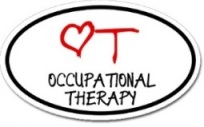
Oh, how I love to be an Occupational Therapist! Let me tell you why.
People often don’t know what Occupational Therapy is until they need it. So, to explain. Let’s take a typical day in the life of a person:
» Get out of bed.
» Have a wash, get dressed, eat breakfast.
» Go to work, but first take the kids to school.
» Remember to leave work early to run by the post office and bank
» Stop by the supermarket
» Cook the evening meal (including the washing up!)
» Tidy the house. (The dog made more mess than the kids.)
» Chat to your friend on the phone, then go to bed.
Now, imagine you have had a brain injury:
Can you physically get out of bed? What about getting about in the community? Working? Speaking? Remembering to do things? And cleaning the house.. well suddenly it is something you want to do if only you could… and the kids? oh and the dog?! suddenly overwhelming.
This is when you need an OT. Here are some of the ways we can help people with neurological conditions.
Thinking skills.
Thinking skills are often affected by brain injury. This includes attention, memory, planning, problem solving and being aware of the world around you. For many, it is actually understanding there is a cognitive change in the first place. People often find these problems the most challenging, since they are invisible to others. Yet, they affect life just as much (or more) than physical problems.
We complete comprehensive assessments, combining standardised paper-based tests with real-life functional ones to understand how your thinking skills may have changed. We can work on specific problem-areas and build on your strengths. The focus of cognitive rehab is also on learning to compensate and adapt to challenges. We will help you develop a range of strategies to use wherever you are, whether at home or at work.
Physical skills and health.
This may include weakness, sensory changes, increased tone or spasticity. We can address these problems by treating them directly, as well as adapting and learning new ways of doing things. We consider how these problems may affect daily life – the sitting, walking, using your hands, moving and being comfortable in a position.
The environment.
OTs are quite good at considering how the world around you affects those everyday things. We can assess your environment and can recommend any changes or adaptations that will help, including those bits of useful kit.
Fatigue Management.
Neurological fatigue can be devastating. This is when your neural pathways become overloaded – it takes extra energy to make the neural connections. Especially when you have cognitive problems, just thinking can be exhausting. This type of fatigue is very different than general tiredness that everyone gets. Learning to manage neurological fatigue is often the key to rehabilitation, and we usually start our work here if you experience it.
Communication.
Language and communication abilities can be affected by neurological conditions, and can be frustrating for people. We can work with you to understand what has changed. We focus particularly on helping you adapt so that you can continue meaningful communication with those around you. This may be at home with your family, out in the community or at work.
Anxiety Management.
Many people feel anxious, particularly when faced with new challenges. Anxiety can be normal in small doses, but can be a barrier when you feel it often. We can help you understand what contributes to feeling anxiety, and how to manage it day to day so you can get on with life.
Personality and behaviour.
People sometimes find that their personality changes after brain injury. You may feel more angry or frustrated, and it may be harder to control your impulses or behaviour towards others. This can be distressing, for you as well as your family. We are experienced in working with these challenges, and can help through assessment of the triggers to behaviours and what strategies may help calm situations.
Life roles and families.
We think this is particularly important, so we gave it it’s own section. Life is about meaning and purpose, and the roles that give the meaning can feel changed after injury. Are you a partner? son/daughter? mother/father? Budding chef? Dabbler in the arts? worker? the list goes on and on…
We also consider the impact on families and help them too. We actually consider them part of the rehab programme, if that’s ok with you.
Return to work.
Vocational rehab is a particular specialty of OT. We talk a lot about this over here.
